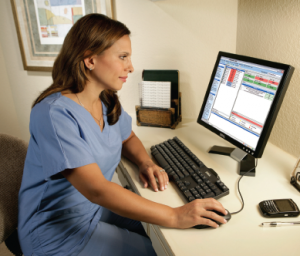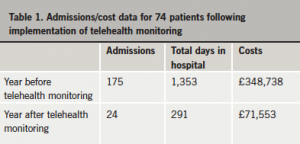A survey it carried out following the introduction of telehealth monitoring to the homes of 74 people suffering from long-term conditions in NHS Birmingham East and North, showed savings of £277,187 through reduced hospital admissions for relevant conditions (see table 1). The number of hospital admissions for the group fell from 175 in the 12 months before monitoring began, to 24 in the 12 months following introduction of the programme. Total number of days spent in hospital was reduced by 1,062 (table 1).

OwnHealth is a partnership between NHS Birmingham North and East, UK Pfizer Health Solutions and NHS Direct, which has monitored members with illnesses including cardiovascular disease, chronic obstructive pulmonary disease (COPD), hypertension and stroke since 2006. A home-based monitoring device (Genesis DM, Honeywell HomMed) has been provided to 180 of OwnHealth’s 9,000 members over the last two years, allowing care managers to ensure trends such as blood pressure, weight level, and oxygen saturation remain within predetermined parameters.
The Birmingham OwnHealth programme is one of the largest and oldest in the UK. Care managers at their call centre undertake caseloads of 140-180 members each, trained in empowering communications techniques. Since its inception the service

has drawn a portion of calls away from GP surgeries, and now takes roughly 200 incoming calls a week. Members report a high level of satisfaction up to 95%, similar to that seen with face-to-face care.
Wider application of telehealth could help NHS Trusts reach the £15-20 billion of efficiencies required by 2014, according to Andrew Donald, Chief Executive for NHS Birmingham East and North. “If we continue to implement the cost system we’ve got at the moment, we won’t be able to afford what we want in the future” he said, calling for a “technology explosion” to shift the paradigm of care for long-term conditions away from hospitals and toward home-based telehealth.
He also emphasised the need to simultaneously scale down conventional care: “Unless you start to reduce hospital capacity and bed capacity the savings don’t become real…We need to take all the people with a chronic condition in our patch and give them OwnHealth and the technology to support it. We need to take a massive risk in terms of putting the money up to do that”.
Telehealth could also meet the call in last year’s white paper1 to give patients more “choice and control” over their treatment, according to Donald. He believes that the NHS has encouraged “learned helplessness” in people with long-term conditions, which can be countered when they are charged with monitoring and reporting their own symptoms. Telehealth, he asserts, has been marginalised due to “cultural barriers” within the NHS – the reluctance of doctors to delegate too much responsibility and control – rather than resistance from patients themselves.
Despite the recent extension of OwnHealth’s partnership with Pfizer Health Solutions and NHS Direct to 2012, its future is far from certain according to John Grayland, another spokesperson for the programme: “It’s so difficult because it’s very fluid at the moment with the NHS reforms…it looks like three GP consortia will emerge for the area, and if that’s how it remains it will be up to them if they want to keep OwnHealth”.2
Despite the programme’s reported success a multicentre, controlled trial published recently in the New England Journal of Medicine3 found no reduction in the risk of hospital readmission for patients with
heart-failure treated through telemonitoring as compared with usual care. However, the trial tested a commercial system (Pharos Innovations) which relies solely on the patient self-reporting symptoms via “a series of questions about general health and heart-failure symptoms”. A previous study4 which tested an automated home-monitoring system similar to that employed by OwnHealth, directly measuring “weight, blood pressure, heart rate, and rhythm”, found “combined benefits on mortality and consumption of health care resource”.
Tim Kelleher
References
1. Equity and excellence: Liberating the NHS. Department of Health. July 2010
2. Bruce S. Birmingham OwnHealth contract extended. E-Health Insider 8 February 2011 (Available online: http://www.ehi.co.uk/news/EHI/6625/birmingham_ownhealth_contract_extended)
3. Chaudhry SI, Mattera JA, Curtis JP et al. Telemonitoring in patients with heart failure. N Engl J Med 2010;363:2301-9.
4. Cleland JGF, Louis AA, Rigby AS, Janssens U, Balk AHMM, on behalf of the TEN-HMS Investigators. Noninvasive home telemonitoring for patients with heart failure at high risk of recurrent admission and death the Trans-European Network–Home-Care Management System (TEN-HMS) study. J Am Coll Cardiol 2005;45:1654-64.
